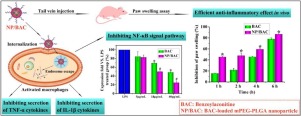当前位置:
X-MOL 学术
›
Colloids Surf. B Biointerfaces
›
论文详情
Our official English website, www.x-mol.net, welcomes your
feedback! (Note: you will need to create a separate account there.)
Delivery of benzoylaconitine using biodegradable nanoparticles to suppress inflammation via regulating NF-κB signaling.
Colloids and Surfaces B: Biointerfaces ( IF 5.4 ) Pub Date : 2020-03-31 , DOI: 10.1016/j.colsurfb.2020.110980 Weiwei Gai 1 , Xuefang Hao 1 , Jiadi Zhao 1 , Lina Wang 1 , Jinghai Liu 1 , Haixia Jiang 2 , Hua Jin 3 , Guoli Liu 3 , Yakai Feng 4
Colloids and Surfaces B: Biointerfaces ( IF 5.4 ) Pub Date : 2020-03-31 , DOI: 10.1016/j.colsurfb.2020.110980 Weiwei Gai 1 , Xuefang Hao 1 , Jiadi Zhao 1 , Lina Wang 1 , Jinghai Liu 1 , Haixia Jiang 2 , Hua Jin 3 , Guoli Liu 3 , Yakai Feng 4
Affiliation

|
Rheumatoid arthritis (RA) is a kind of systemic autoimmune disease, and patients with RA usually suffer serious pain, resulting in low quality of life. The development of drug delivery systems (DDSs) provides a valid approach for RA therapy via inhibiting the secretion of inflammatory cytokines from macrophages. As a prevailing drug nanocarrier with distinctive superiority, polymeric nanoparticles (NPs) have attracted much attention in recent years. However, low biocompatibility and limited exploitation of drug with high efficiency are still the main challenges in RA treatment. To overcome the limitations, we prepared a biocompatible copolymer methoxy-poly(ethylene glycol)-poly(lactide-co-glycolide) (mPEG-PLGA). Moreover, benzoylaconitine (BAC) with superior anti-inflammatory effect was selected as model drug. It was isolated from Aconitum kusnezoffii Reichb and encapsulated into mPEG-PLGA NPs (NP/BAC) to increase the bioavailablity of BAC. The NPs exhibited high cytocompatibility for activated macrophages and well compatibility with red blood cells. Furthermore, the anti-inflammatory property of NP/BAC was testified by substantially inhibiting secretion of pro-inflammatory cytokines. The TNF-α and IL-1β cytokines of NP/BAC group reduced 70 % and 66 % compared with that of activated macrophages. Especially, NP/BAC reduced the overexpression of NF-κB p65 to inhibit NF-κB signaling pathway, which was a critical regulator of inflammatory responses. NP/BAC also showed efficient in vivo anti-inflammatory effect with high ear (69.8 %) and paw (87.1 %) swelling suppressing rate. These results revealed the anti-inflammatory mechanism of NP/BAC and proved it was a suitable DDS to suppress inflammation, providing a promising strategy for RA therapy and research of Aconitum kusnezoffii Reichb.
中文翻译:

使用可生物降解的纳米颗粒递送苯甲酰肾上腺素以通过调节NF-κB信号传导抑制炎症。
类风湿关节炎(RA)是一种全身性自身免疫性疾病,RA患者通常会遭受严重的疼痛,从而导致生活质量下降。药物递送系统(DDS)的发展通过抑制巨噬细胞炎症性细胞因子的分泌,为RA治疗提供了有效的方法。作为具有独特优势的流行的药物纳米载体,聚合物纳米颗粒(NPs)近年来引起了很多关注。然而,低生物相容性和有限的高效药物开发仍然是RA治疗中的主要挑战。为了克服这些限制,我们制备了生物相容性共聚物甲氧基-聚(乙二醇)-聚(丙交酯-共-乙交酯)(mPEG-PLGA)。此外,选择具有优异抗炎作用的苯甲酰肾上腺素(BAC)作为模型药物。它是从乌头乌头中分离得到的,并封装在mPEG-PLGA NP(NP / BAC)中以增加BAC的生物利用度。NP对活化的巨噬细胞显示出高细胞相容性,并与红细胞具有良好的相容性。此外,通过基本上抑制促炎细胞因子的分泌证明了NP / BAC的抗炎特性。与活化的巨噬细胞相比,NP / BAC组的TNF-α和IL-1β细胞因子降低了70%和66%。尤其是,NP / BAC降低了NF-κBp65的过表达,从而抑制了NF-κB信号传导途径,而NF-κB信号传导通路是炎症反应的关键调节因子。NP / BAC还显示出有效的体内抗炎作用,具有较高的耳朵(69.8%)和爪(87.1%)肿胀抑制率。
更新日期:2020-03-31
中文翻译:

使用可生物降解的纳米颗粒递送苯甲酰肾上腺素以通过调节NF-κB信号传导抑制炎症。
类风湿关节炎(RA)是一种全身性自身免疫性疾病,RA患者通常会遭受严重的疼痛,从而导致生活质量下降。药物递送系统(DDS)的发展通过抑制巨噬细胞炎症性细胞因子的分泌,为RA治疗提供了有效的方法。作为具有独特优势的流行的药物纳米载体,聚合物纳米颗粒(NPs)近年来引起了很多关注。然而,低生物相容性和有限的高效药物开发仍然是RA治疗中的主要挑战。为了克服这些限制,我们制备了生物相容性共聚物甲氧基-聚(乙二醇)-聚(丙交酯-共-乙交酯)(mPEG-PLGA)。此外,选择具有优异抗炎作用的苯甲酰肾上腺素(BAC)作为模型药物。它是从乌头乌头中分离得到的,并封装在mPEG-PLGA NP(NP / BAC)中以增加BAC的生物利用度。NP对活化的巨噬细胞显示出高细胞相容性,并与红细胞具有良好的相容性。此外,通过基本上抑制促炎细胞因子的分泌证明了NP / BAC的抗炎特性。与活化的巨噬细胞相比,NP / BAC组的TNF-α和IL-1β细胞因子降低了70%和66%。尤其是,NP / BAC降低了NF-κBp65的过表达,从而抑制了NF-κB信号传导途径,而NF-κB信号传导通路是炎症反应的关键调节因子。NP / BAC还显示出有效的体内抗炎作用,具有较高的耳朵(69.8%)和爪(87.1%)肿胀抑制率。











































 京公网安备 11010802027423号
京公网安备 11010802027423号